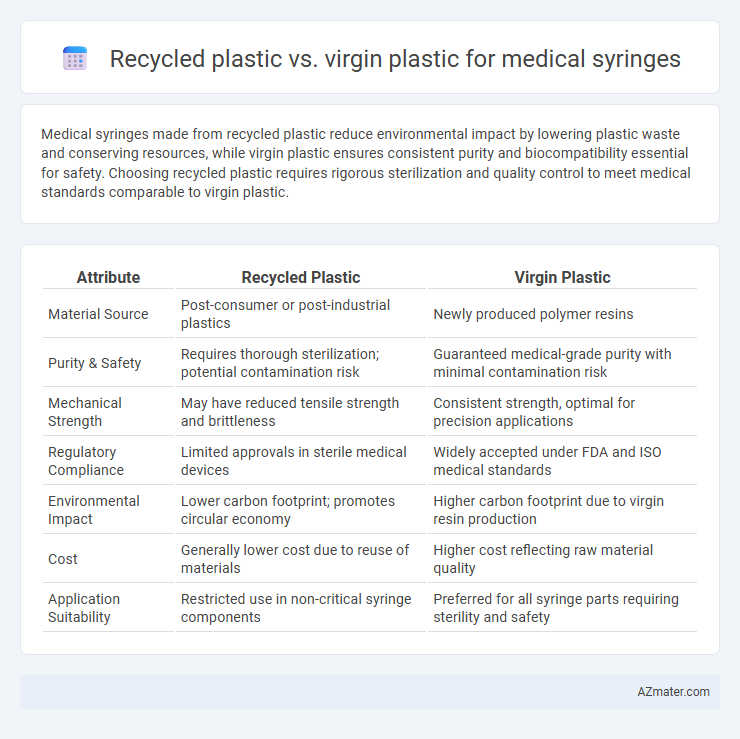Medical syringes made from recycled plastic reduce environmental impact by lowering plastic waste and conserving resources, while virgin plastic ensures consistent purity and biocompatibility essential for safety. Choosing recycled plastic requires rigorous sterilization and quality control to meet medical standards comparable to virgin plastic.
Table of Comparison
| Attribute | Recycled Plastic | Virgin Plastic |
|---|---|---|
| Material Source | Post-consumer or post-industrial plastics | Newly produced polymer resins |
| Purity & Safety | Requires thorough sterilization; potential contamination risk | Guaranteed medical-grade purity with minimal contamination risk |
| Mechanical Strength | May have reduced tensile strength and brittleness | Consistent strength, optimal for precision applications |
| Regulatory Compliance | Limited approvals in sterile medical devices | Widely accepted under FDA and ISO medical standards |
| Environmental Impact | Lower carbon footprint; promotes circular economy | Higher carbon footprint due to virgin resin production |
| Cost | Generally lower cost due to reuse of materials | Higher cost reflecting raw material quality |
| Application Suitability | Restricted use in non-critical syringe components | Preferred for all syringe parts requiring sterility and safety |
Introduction to Medical Syringes: Recycled vs Virgin Plastic
Medical syringes demand high standards of sterility and durability, where virgin plastic offers consistent purity and mechanical strength essential for patient safety. Recycled plastic, while environmentally beneficial by reducing plastic waste, often faces challenges in meeting stringent regulatory requirements due to potential contamination and variability in material properties. Innovations in recycling technology aim to enhance the quality of recycled plastics, making them increasingly viable alternatives for medical syringe production without compromising reliability.
Material Properties: Strength and Safety Comparison
Recycled plastic used in medical syringes generally exhibits lower tensile strength and may contain contaminants, impacting overall safety compared to virgin plastic, which offers consistent purity and superior mechanical properties. Virgin plastic ensures higher resistance to stress and sterilization processes, maintaining syringe integrity and reducing risk of failure during medical use. Material certification standards for medical devices prioritize virgin plastics to meet strict biocompatibility and hygiene requirements essential for patient safety.
Manufacturing Processes: Recycled vs Virgin Plastics
Manufacturing medical syringes from virgin plastic involves using high-purity polymer resins that undergo stringent processing to ensure biocompatibility and sterility, essential for medical safety standards. In contrast, recycled plastics require extensive cleaning, decontamination, and sorting processes to remove impurities, which may compromise material consistency and pose challenges in meeting regulatory requirements for medical-grade products. Advanced recycling technologies, such as chemical recycling, aim to restore polymers to near-virgin quality, enabling safer integration into syringe manufacturing without compromising performance or patient safety.
Regulatory Standards and Compliance
Recycled plastic used in medical syringes must meet stringent regulatory standards such as ISO 10993 for biocompatibility and FDA 21 CFR Part 820 for quality system requirements, ensuring safety and performance equal to virgin plastic. Virgin plastic remains the preferred material due to consistent purity, traceability, and ease of validation against contamination risks, facilitating compliance with regulatory agencies like the FDA and EMA. Both materials undergo rigorous testing for sterility, mechanical strength, and chemical resistance to meet compliance benchmarks critical for medical device approval.
Cost Analysis: Production and Supply Chain
Recycled plastic in medical syringe production offers significant cost savings by reducing raw material expenses compared to virgin plastic, which demands higher energy and resource inputs. The supply chain benefits from using recycled plastic through lowered transportation costs and decreased dependency on fossil-fuel-based petrochemicals, leading to improved sustainability and price stability. However, ensuring consistent quality and regulatory compliance in recycled plastics can increase testing and certification costs, partially offsetting material savings.
Environmental Impact: Carbon Footprint and Waste Reduction
Recycled plastic medical syringes significantly reduce the carbon footprint by lowering energy consumption and greenhouse gas emissions during production compared to virgin plastic syringes. Utilizing recycled materials helps divert plastic waste from landfills and oceans, contributing to substantial waste reduction in the healthcare sector. This environmental benefit supports sustainable medical practices by minimizing resource extraction and promoting circular economy principles in syringe manufacturing.
Sterility and Contamination Risks
Recycled plastic in medical syringes poses significant sterility and contamination risks compared to virgin plastic, as recycled materials may retain microbial residues or chemical contaminants despite sterilization attempts. Virgin plastic offers a higher assurance of purity and consistent material properties crucial for maintaining strict sterility standards in medical applications. Regulatory bodies typically favor virgin plastic for syringes due to its lower risk profile in preventing infections and ensuring patient safety.
Performance and Durability in Medical Applications
Recycled plastic medical syringes often face challenges in matching the performance and durability standards of virgin plastic counterparts due to potential contamination and material degradation during reprocessing. Virgin plastic syringes ensure consistent mechanical strength, chemical resistance, and sterility, critical for maintaining precision and safety in medical applications. Advances in recycled plastic processing aim to improve polymer integrity, but current regulatory standards primarily favor virgin materials for high-risk medical device manufacturing.
Market Trends and Adoption in Healthcare
Recycled plastic syringes are gaining traction in the healthcare market due to increasing environmental regulations and a growing emphasis on sustainability, while virgin plastic remains dominant because of its superior sterility and biocompatibility standards. Market trends reveal a cautious but rising adoption of recycled plastics in non-critical syringe components, driven by advancements in sterilization technology and regulatory approvals from bodies like the FDA and EMA. Healthcare providers are gradually incorporating recycled materials as part of circular economy initiatives, balancing cost-effectiveness with stringent safety and performance requirements.
Future Outlook for Sustainable Medical Syringe Production
The future outlook for sustainable medical syringe production increasingly favors recycled plastic due to its lower environmental impact and resource conservation benefits compared to virgin plastic. Advances in polymer recycling technology and stringent sterilization processes are enhancing the safety and performance standards necessary for medical applications. Adoption of recycled plastics in syringes supports circular economy goals while reducing carbon footprint and medical waste in healthcare systems worldwide.

Infographic: Recycled plastic vs Virgin plastic for Medical syringe
 azmater.com
azmater.com